Notions of Otherness and Racial Identity in Heart of Darkness
VerifiedAdded on 2023/05/28
|6
|1531
|241
Essay
AI Summary
This essay provides an in-depth analysis of Joseph Conrad's Heart of Darkness, focusing on the themes of otherness and racial identity. It examines the representation of Europeans and native Africans, highlighting the distorted racial identities and the impact of colonialism. The essay explores how Conrad portrays Africa as a place of darkness and mystery, contrasting it with a supposedly civilized London. It also discusses the concept of 'otherness' and compares Conrad's work with Chinua Achebe's Things Fall Apart to provide a contrasting perspective on the subject. The essay critiques the novella's potential unintentional racism and its impact on the identities of both Europeans and Africans, concluding with a summary of the key findings and arguments.
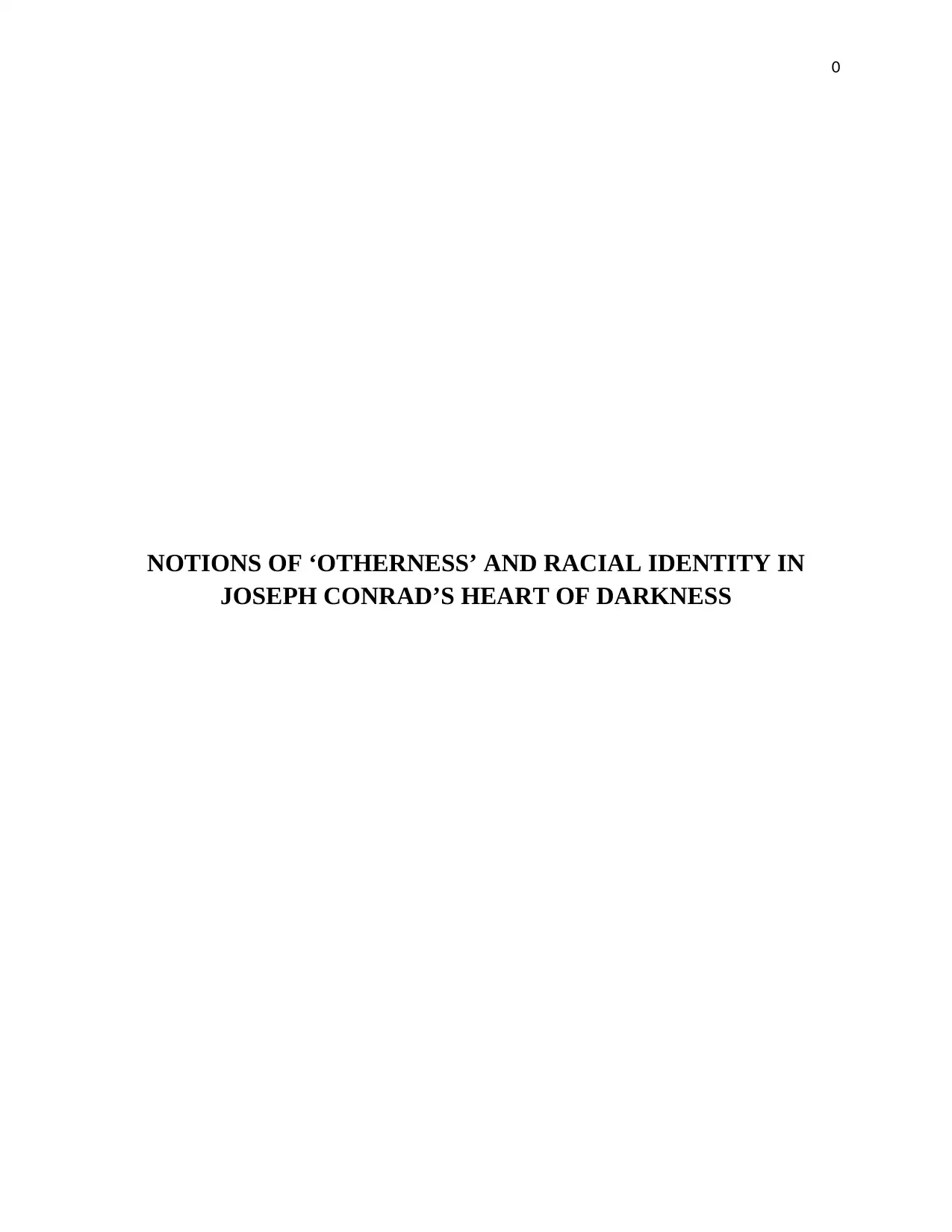
0
NOTIONS OF ‘OTHERNESS’ AND RACIAL IDENTITY IN
JOSEPH CONRAD’S HEART OF DARKNESS
NOTIONS OF ‘OTHERNESS’ AND RACIAL IDENTITY IN
JOSEPH CONRAD’S HEART OF DARKNESS
Paraphrase This Document
Need a fresh take? Get an instant paraphrase of this document with our AI Paraphraser
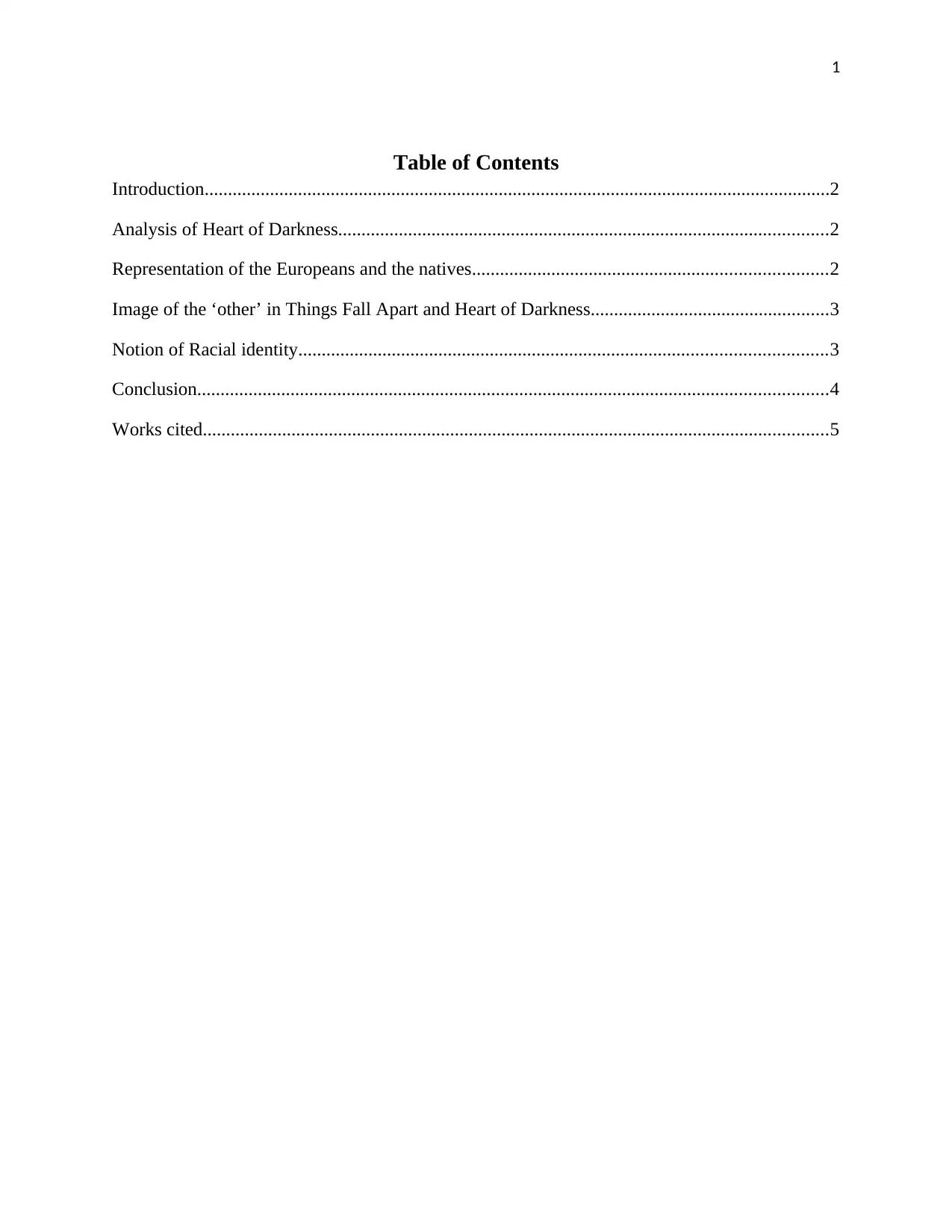
1
Table of Contents
Introduction......................................................................................................................................2
Analysis of Heart of Darkness.........................................................................................................2
Representation of the Europeans and the natives............................................................................2
Image of the ‘other’ in Things Fall Apart and Heart of Darkness...................................................3
Notion of Racial identity.................................................................................................................3
Conclusion.......................................................................................................................................4
Works cited......................................................................................................................................5
Table of Contents
Introduction......................................................................................................................................2
Analysis of Heart of Darkness.........................................................................................................2
Representation of the Europeans and the natives............................................................................2
Image of the ‘other’ in Things Fall Apart and Heart of Darkness...................................................3
Notion of Racial identity.................................................................................................................3
Conclusion.......................................................................................................................................4
Works cited......................................................................................................................................5
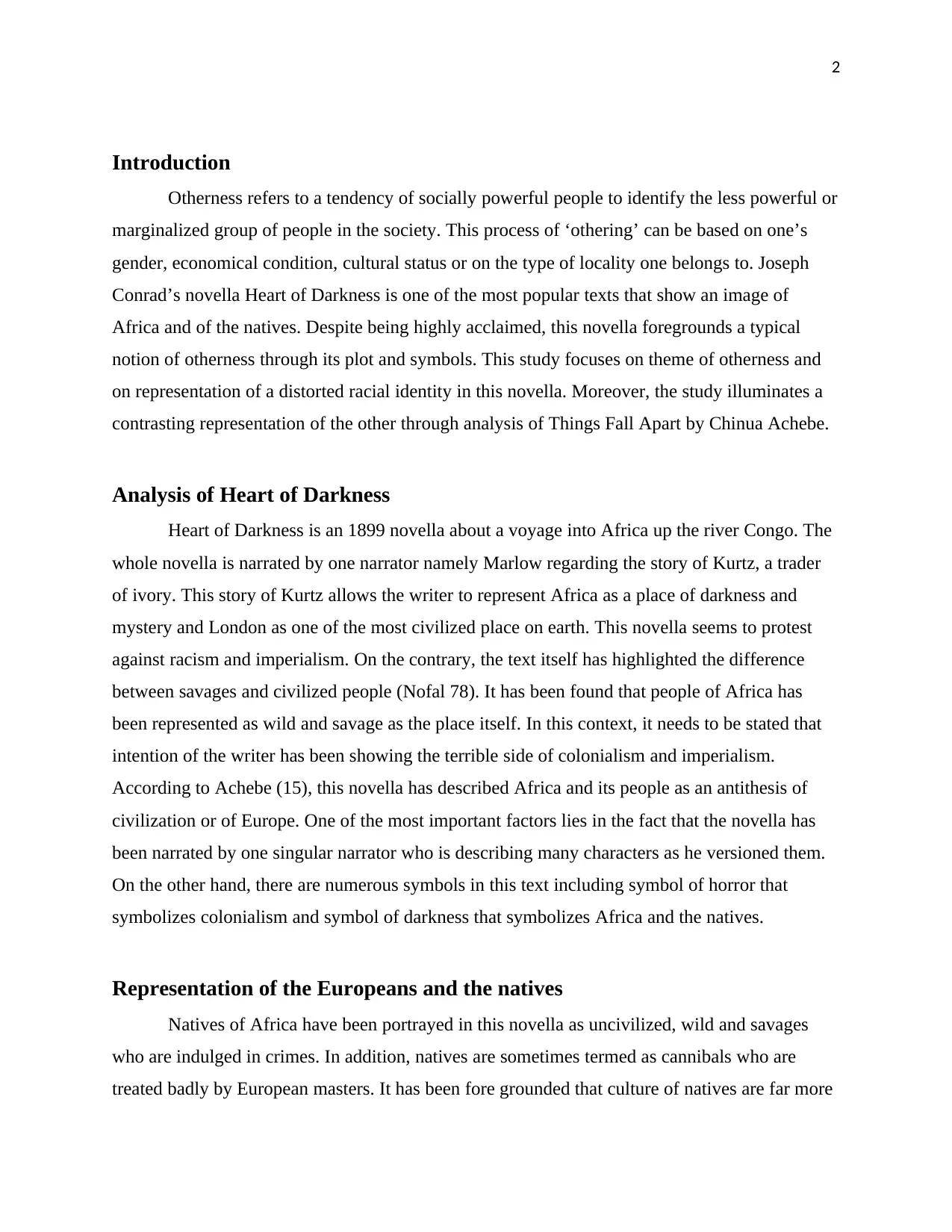
2
Introduction
Otherness refers to a tendency of socially powerful people to identify the less powerful or
marginalized group of people in the society. This process of ‘othering’ can be based on one’s
gender, economical condition, cultural status or on the type of locality one belongs to. Joseph
Conrad’s novella Heart of Darkness is one of the most popular texts that show an image of
Africa and of the natives. Despite being highly acclaimed, this novella foregrounds a typical
notion of otherness through its plot and symbols. This study focuses on theme of otherness and
on representation of a distorted racial identity in this novella. Moreover, the study illuminates a
contrasting representation of the other through analysis of Things Fall Apart by Chinua Achebe.
Analysis of Heart of Darkness
Heart of Darkness is an 1899 novella about a voyage into Africa up the river Congo. The
whole novella is narrated by one narrator namely Marlow regarding the story of Kurtz, a trader
of ivory. This story of Kurtz allows the writer to represent Africa as a place of darkness and
mystery and London as one of the most civilized place on earth. This novella seems to protest
against racism and imperialism. On the contrary, the text itself has highlighted the difference
between savages and civilized people (Nofal 78). It has been found that people of Africa has
been represented as wild and savage as the place itself. In this context, it needs to be stated that
intention of the writer has been showing the terrible side of colonialism and imperialism.
According to Achebe (15), this novella has described Africa and its people as an antithesis of
civilization or of Europe. One of the most important factors lies in the fact that the novella has
been narrated by one singular narrator who is describing many characters as he versioned them.
On the other hand, there are numerous symbols in this text including symbol of horror that
symbolizes colonialism and symbol of darkness that symbolizes Africa and the natives.
Representation of the Europeans and the natives
Natives of Africa have been portrayed in this novella as uncivilized, wild and savages
who are indulged in crimes. In addition, natives are sometimes termed as cannibals who are
treated badly by European masters. It has been fore grounded that culture of natives are far more
Introduction
Otherness refers to a tendency of socially powerful people to identify the less powerful or
marginalized group of people in the society. This process of ‘othering’ can be based on one’s
gender, economical condition, cultural status or on the type of locality one belongs to. Joseph
Conrad’s novella Heart of Darkness is one of the most popular texts that show an image of
Africa and of the natives. Despite being highly acclaimed, this novella foregrounds a typical
notion of otherness through its plot and symbols. This study focuses on theme of otherness and
on representation of a distorted racial identity in this novella. Moreover, the study illuminates a
contrasting representation of the other through analysis of Things Fall Apart by Chinua Achebe.
Analysis of Heart of Darkness
Heart of Darkness is an 1899 novella about a voyage into Africa up the river Congo. The
whole novella is narrated by one narrator namely Marlow regarding the story of Kurtz, a trader
of ivory. This story of Kurtz allows the writer to represent Africa as a place of darkness and
mystery and London as one of the most civilized place on earth. This novella seems to protest
against racism and imperialism. On the contrary, the text itself has highlighted the difference
between savages and civilized people (Nofal 78). It has been found that people of Africa has
been represented as wild and savage as the place itself. In this context, it needs to be stated that
intention of the writer has been showing the terrible side of colonialism and imperialism.
According to Achebe (15), this novella has described Africa and its people as an antithesis of
civilization or of Europe. One of the most important factors lies in the fact that the novella has
been narrated by one singular narrator who is describing many characters as he versioned them.
On the other hand, there are numerous symbols in this text including symbol of horror that
symbolizes colonialism and symbol of darkness that symbolizes Africa and the natives.
Representation of the Europeans and the natives
Natives of Africa have been portrayed in this novella as uncivilized, wild and savages
who are indulged in crimes. In addition, natives are sometimes termed as cannibals who are
treated badly by European masters. It has been fore grounded that culture of natives are far more
⊘ This is a preview!⊘
Do you want full access?
Subscribe today to unlock all pages.

Trusted by 1+ million students worldwide
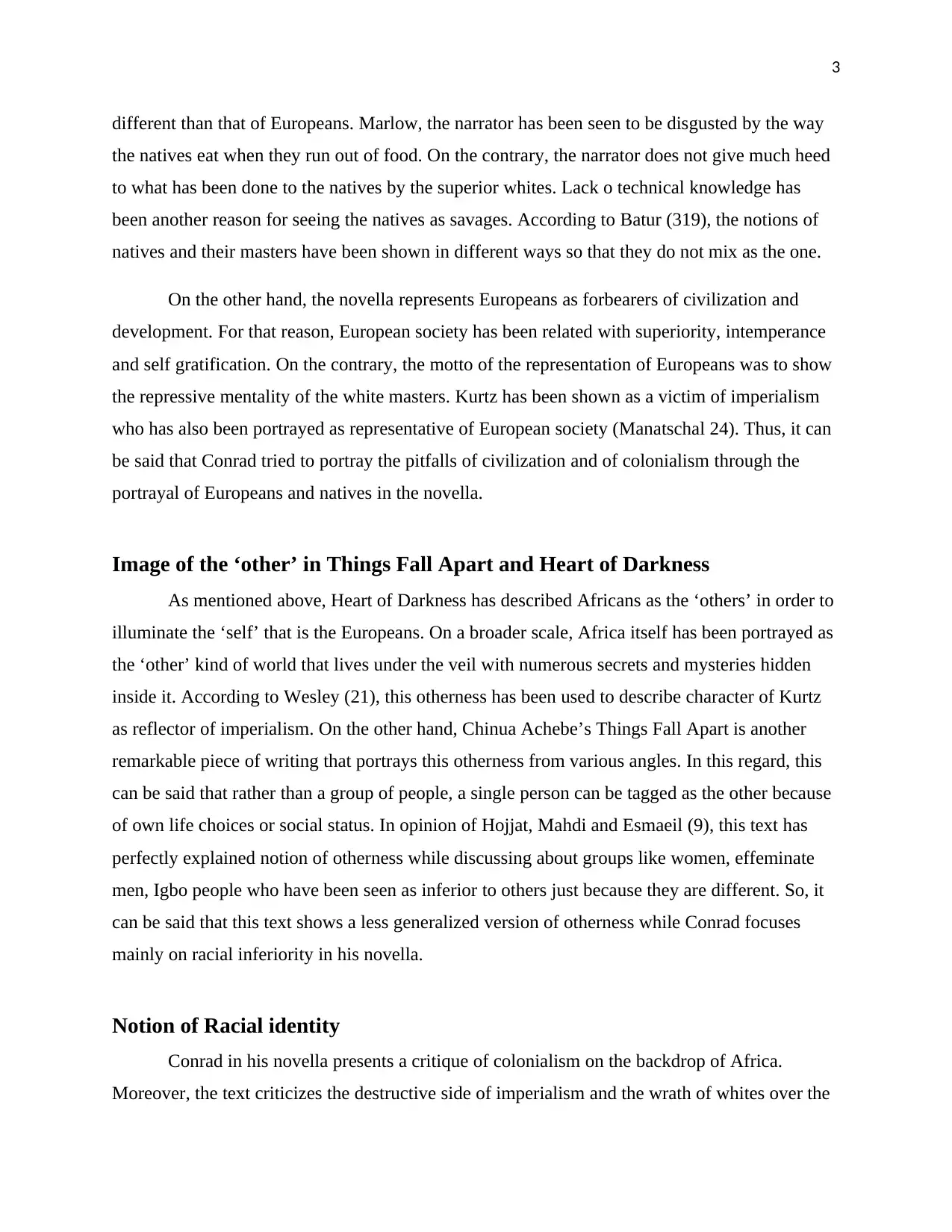
3
different than that of Europeans. Marlow, the narrator has been seen to be disgusted by the way
the natives eat when they run out of food. On the contrary, the narrator does not give much heed
to what has been done to the natives by the superior whites. Lack o technical knowledge has
been another reason for seeing the natives as savages. According to Batur (319), the notions of
natives and their masters have been shown in different ways so that they do not mix as the one.
On the other hand, the novella represents Europeans as forbearers of civilization and
development. For that reason, European society has been related with superiority, intemperance
and self gratification. On the contrary, the motto of the representation of Europeans was to show
the repressive mentality of the white masters. Kurtz has been shown as a victim of imperialism
who has also been portrayed as representative of European society (Manatschal 24). Thus, it can
be said that Conrad tried to portray the pitfalls of civilization and of colonialism through the
portrayal of Europeans and natives in the novella.
Image of the ‘other’ in Things Fall Apart and Heart of Darkness
As mentioned above, Heart of Darkness has described Africans as the ‘others’ in order to
illuminate the ‘self’ that is the Europeans. On a broader scale, Africa itself has been portrayed as
the ‘other’ kind of world that lives under the veil with numerous secrets and mysteries hidden
inside it. According to Wesley (21), this otherness has been used to describe character of Kurtz
as reflector of imperialism. On the other hand, Chinua Achebe’s Things Fall Apart is another
remarkable piece of writing that portrays this otherness from various angles. In this regard, this
can be said that rather than a group of people, a single person can be tagged as the other because
of own life choices or social status. In opinion of Hojjat, Mahdi and Esmaeil (9), this text has
perfectly explained notion of otherness while discussing about groups like women, effeminate
men, Igbo people who have been seen as inferior to others just because they are different. So, it
can be said that this text shows a less generalized version of otherness while Conrad focuses
mainly on racial inferiority in his novella.
Notion of Racial identity
Conrad in his novella presents a critique of colonialism on the backdrop of Africa.
Moreover, the text criticizes the destructive side of imperialism and the wrath of whites over the
different than that of Europeans. Marlow, the narrator has been seen to be disgusted by the way
the natives eat when they run out of food. On the contrary, the narrator does not give much heed
to what has been done to the natives by the superior whites. Lack o technical knowledge has
been another reason for seeing the natives as savages. According to Batur (319), the notions of
natives and their masters have been shown in different ways so that they do not mix as the one.
On the other hand, the novella represents Europeans as forbearers of civilization and
development. For that reason, European society has been related with superiority, intemperance
and self gratification. On the contrary, the motto of the representation of Europeans was to show
the repressive mentality of the white masters. Kurtz has been shown as a victim of imperialism
who has also been portrayed as representative of European society (Manatschal 24). Thus, it can
be said that Conrad tried to portray the pitfalls of civilization and of colonialism through the
portrayal of Europeans and natives in the novella.
Image of the ‘other’ in Things Fall Apart and Heart of Darkness
As mentioned above, Heart of Darkness has described Africans as the ‘others’ in order to
illuminate the ‘self’ that is the Europeans. On a broader scale, Africa itself has been portrayed as
the ‘other’ kind of world that lives under the veil with numerous secrets and mysteries hidden
inside it. According to Wesley (21), this otherness has been used to describe character of Kurtz
as reflector of imperialism. On the other hand, Chinua Achebe’s Things Fall Apart is another
remarkable piece of writing that portrays this otherness from various angles. In this regard, this
can be said that rather than a group of people, a single person can be tagged as the other because
of own life choices or social status. In opinion of Hojjat, Mahdi and Esmaeil (9), this text has
perfectly explained notion of otherness while discussing about groups like women, effeminate
men, Igbo people who have been seen as inferior to others just because they are different. So, it
can be said that this text shows a less generalized version of otherness while Conrad focuses
mainly on racial inferiority in his novella.
Notion of Racial identity
Conrad in his novella presents a critique of colonialism on the backdrop of Africa.
Moreover, the text criticizes the destructive side of imperialism and the wrath of whites over the
Paraphrase This Document
Need a fresh take? Get an instant paraphrase of this document with our AI Paraphraser
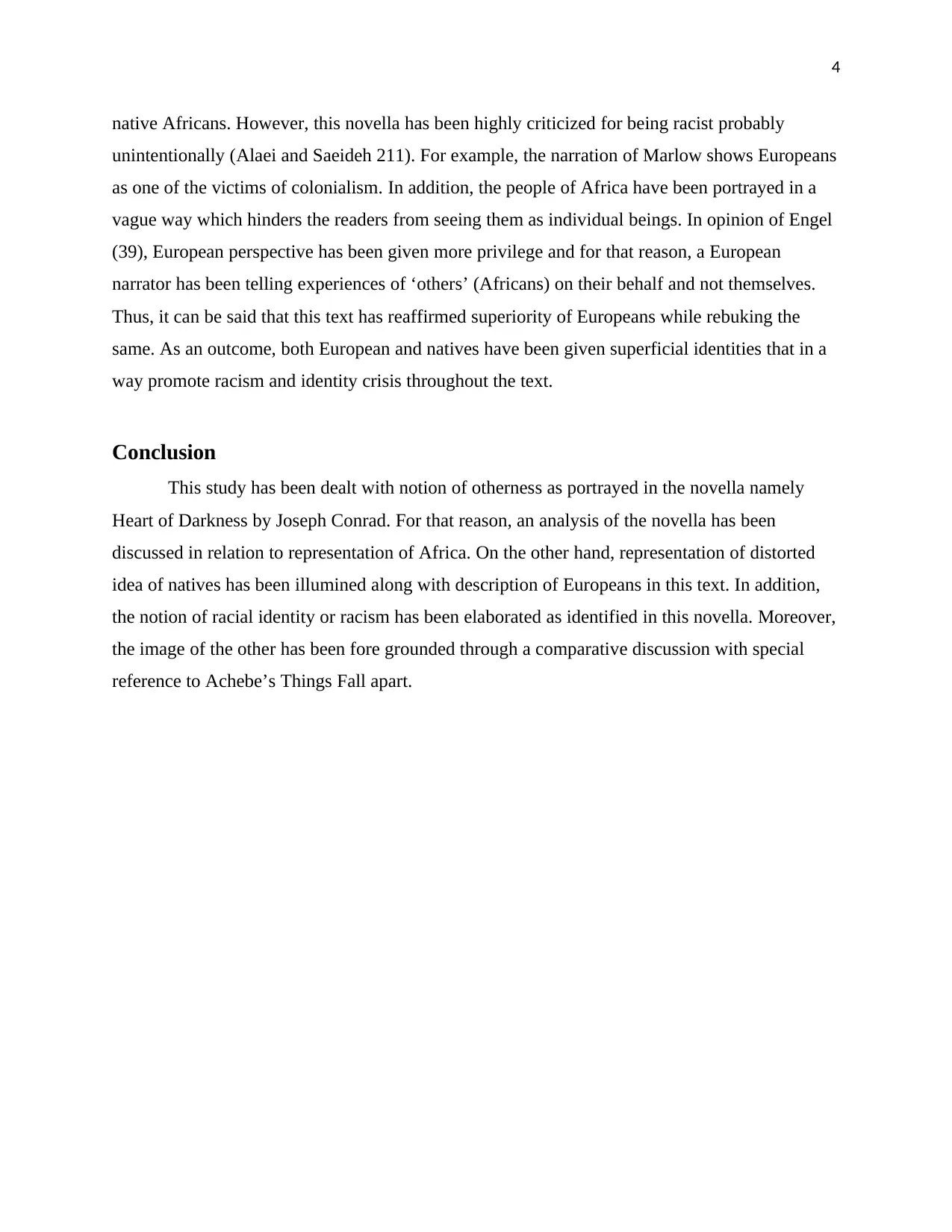
4
native Africans. However, this novella has been highly criticized for being racist probably
unintentionally (Alaei and Saeideh 211). For example, the narration of Marlow shows Europeans
as one of the victims of colonialism. In addition, the people of Africa have been portrayed in a
vague way which hinders the readers from seeing them as individual beings. In opinion of Engel
(39), European perspective has been given more privilege and for that reason, a European
narrator has been telling experiences of ‘others’ (Africans) on their behalf and not themselves.
Thus, it can be said that this text has reaffirmed superiority of Europeans while rebuking the
same. As an outcome, both European and natives have been given superficial identities that in a
way promote racism and identity crisis throughout the text.
Conclusion
This study has been dealt with notion of otherness as portrayed in the novella namely
Heart of Darkness by Joseph Conrad. For that reason, an analysis of the novella has been
discussed in relation to representation of Africa. On the other hand, representation of distorted
idea of natives has been illumined along with description of Europeans in this text. In addition,
the notion of racial identity or racism has been elaborated as identified in this novella. Moreover,
the image of the other has been fore grounded through a comparative discussion with special
reference to Achebe’s Things Fall apart.
native Africans. However, this novella has been highly criticized for being racist probably
unintentionally (Alaei and Saeideh 211). For example, the narration of Marlow shows Europeans
as one of the victims of colonialism. In addition, the people of Africa have been portrayed in a
vague way which hinders the readers from seeing them as individual beings. In opinion of Engel
(39), European perspective has been given more privilege and for that reason, a European
narrator has been telling experiences of ‘others’ (Africans) on their behalf and not themselves.
Thus, it can be said that this text has reaffirmed superiority of Europeans while rebuking the
same. As an outcome, both European and natives have been given superficial identities that in a
way promote racism and identity crisis throughout the text.
Conclusion
This study has been dealt with notion of otherness as portrayed in the novella namely
Heart of Darkness by Joseph Conrad. For that reason, an analysis of the novella has been
discussed in relation to representation of Africa. On the other hand, representation of distorted
idea of natives has been illumined along with description of Europeans in this text. In addition,
the notion of racial identity or racism has been elaborated as identified in this novella. Moreover,
the image of the other has been fore grounded through a comparative discussion with special
reference to Achebe’s Things Fall apart.
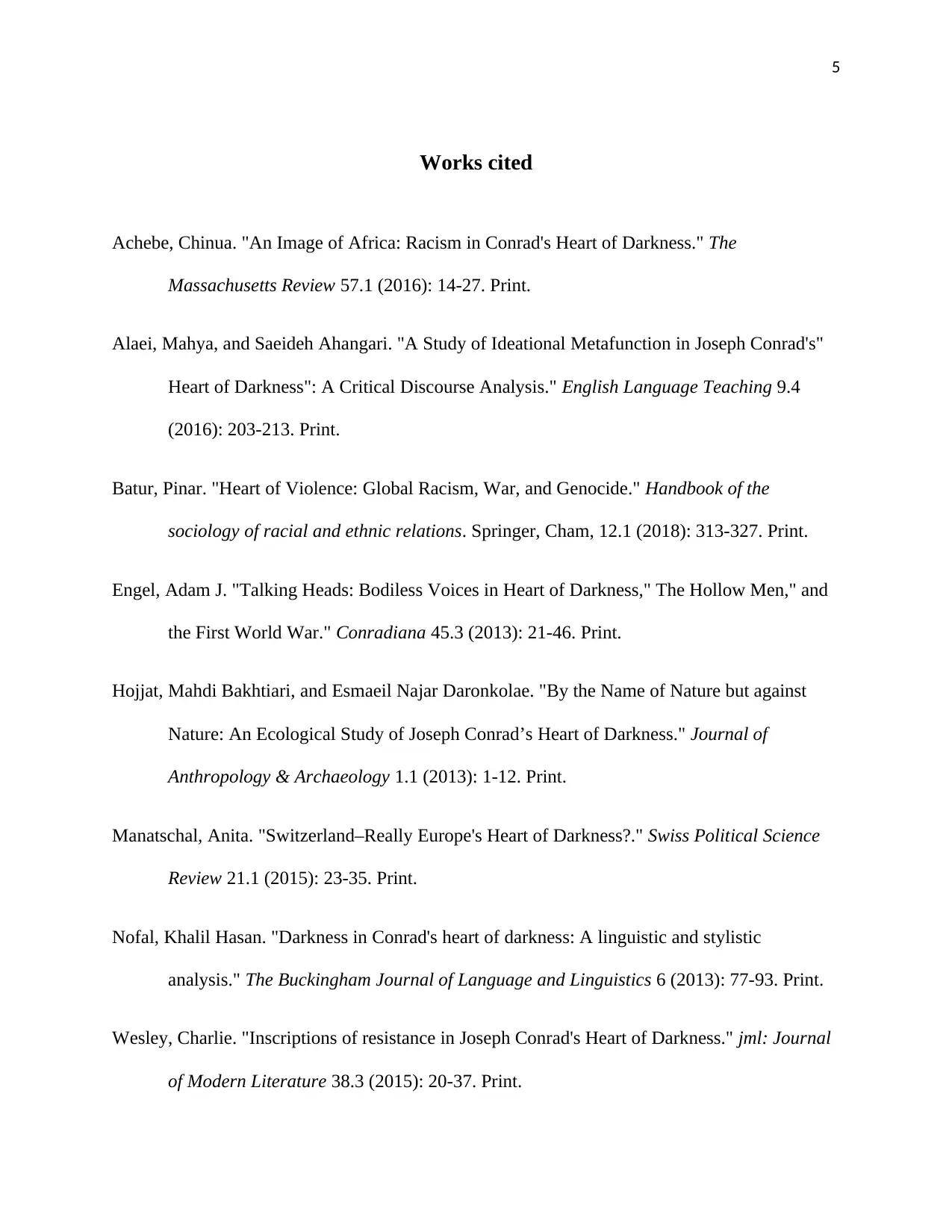
5
Works cited
Achebe, Chinua. "An Image of Africa: Racism in Conrad's Heart of Darkness." The
Massachusetts Review 57.1 (2016): 14-27. Print.
Alaei, Mahya, and Saeideh Ahangari. "A Study of Ideational Metafunction in Joseph Conrad's"
Heart of Darkness": A Critical Discourse Analysis." English Language Teaching 9.4
(2016): 203-213. Print.
Batur, Pinar. "Heart of Violence: Global Racism, War, and Genocide." Handbook of the
sociology of racial and ethnic relations. Springer, Cham, 12.1 (2018): 313-327. Print.
Engel, Adam J. "Talking Heads: Bodiless Voices in Heart of Darkness," The Hollow Men," and
the First World War." Conradiana 45.3 (2013): 21-46. Print.
Hojjat, Mahdi Bakhtiari, and Esmaeil Najar Daronkolae. "By the Name of Nature but against
Nature: An Ecological Study of Joseph Conrad’s Heart of Darkness." Journal of
Anthropology & Archaeology 1.1 (2013): 1-12. Print.
Manatschal, Anita. "Switzerland–Really Europe's Heart of Darkness?." Swiss Political Science
Review 21.1 (2015): 23-35. Print.
Nofal, Khalil Hasan. "Darkness in Conrad's heart of darkness: A linguistic and stylistic
analysis." The Buckingham Journal of Language and Linguistics 6 (2013): 77-93. Print.
Wesley, Charlie. "Inscriptions of resistance in Joseph Conrad's Heart of Darkness." jml: Journal
of Modern Literature 38.3 (2015): 20-37. Print.
Works cited
Achebe, Chinua. "An Image of Africa: Racism in Conrad's Heart of Darkness." The
Massachusetts Review 57.1 (2016): 14-27. Print.
Alaei, Mahya, and Saeideh Ahangari. "A Study of Ideational Metafunction in Joseph Conrad's"
Heart of Darkness": A Critical Discourse Analysis." English Language Teaching 9.4
(2016): 203-213. Print.
Batur, Pinar. "Heart of Violence: Global Racism, War, and Genocide." Handbook of the
sociology of racial and ethnic relations. Springer, Cham, 12.1 (2018): 313-327. Print.
Engel, Adam J. "Talking Heads: Bodiless Voices in Heart of Darkness," The Hollow Men," and
the First World War." Conradiana 45.3 (2013): 21-46. Print.
Hojjat, Mahdi Bakhtiari, and Esmaeil Najar Daronkolae. "By the Name of Nature but against
Nature: An Ecological Study of Joseph Conrad’s Heart of Darkness." Journal of
Anthropology & Archaeology 1.1 (2013): 1-12. Print.
Manatschal, Anita. "Switzerland–Really Europe's Heart of Darkness?." Swiss Political Science
Review 21.1 (2015): 23-35. Print.
Nofal, Khalil Hasan. "Darkness in Conrad's heart of darkness: A linguistic and stylistic
analysis." The Buckingham Journal of Language and Linguistics 6 (2013): 77-93. Print.
Wesley, Charlie. "Inscriptions of resistance in Joseph Conrad's Heart of Darkness." jml: Journal
of Modern Literature 38.3 (2015): 20-37. Print.
⊘ This is a preview!⊘
Do you want full access?
Subscribe today to unlock all pages.

Trusted by 1+ million students worldwide
1 out of 6
Related Documents
Your All-in-One AI-Powered Toolkit for Academic Success.
+13062052269
info@desklib.com
Available 24*7 on WhatsApp / Email
![[object Object]](/_next/static/media/star-bottom.7253800d.svg)
Unlock your academic potential
Copyright © 2020–2026 A2Z Services. All Rights Reserved. Developed and managed by ZUCOL.





